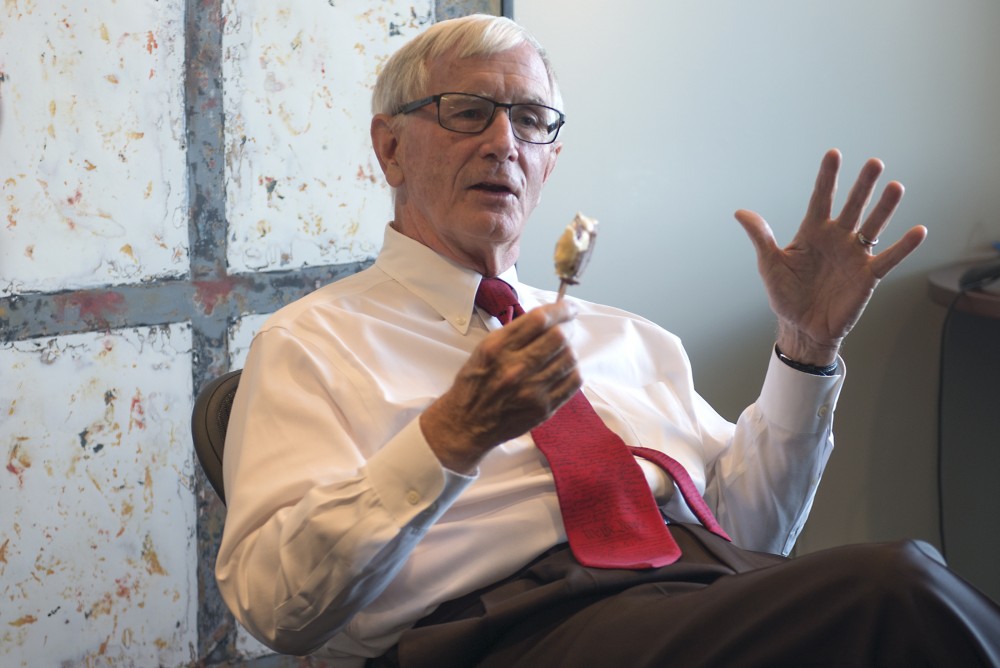After 34 years, Bill Donohue’s career as the University’s General Counsel came to a close last week.
Donohue, who started as deputy general counsel in 1982 and rose to general counsel three years ago, retired on Sept. 1. He represented the University in legal dealings and transactions and protected faculty rights.
Before starting at the University, Donohue worked at the Minnesota Attorney General’s office.
“I represented the state and the governor and various public officials in litigation mostly revolving around the constitutionality of statutes,” he said.
Richard Beeson, a member of the University’s Board of Regents, said Donohue was involved with many high profile lawsuits,including the controver-sial resignation of Norwood Teague — one of the University’s former athletics director.
“Athletics, as we know, whether it’s on the playing field or off the playing field … tends to attract more media attention than almost any other subject,” Beeson said.
Dean Johnson, Board of Regents chair, said he worked closely with Donahue on personnel issues in his nine years serving at the University.
“For instance, when former athletics director Norwood Teague committed some missteps, that immediately landed in the lap of the general counsel and Bill Donohue,” he said. “He sought the facts to the best of his ability, worked closely with law enforcement, kept the President and the Board of Regents informed and … he always based his work on the facts.”
Johnson said many of the controversial cases that came across Donohue’s desk provoked disagreement and criticism from faculty around the University.
“I never saw him get emotionally excited, but always had a calm demeanor which allowed him to be thoughtful about the issue before him,” he said.
Pharmaceutical litigation
Donohue also handled litigation to protect intellectual property of the University in 1999, when the University sued Glaxo-Wellcome, a drug manufacturer, he said.
Donohue said the company infringed on University professor Robert Vince’s patented AIDS drug. The drug was distributed around the world by the company.
“We were able to make the point that … we had patented the drug, we had licensed the drug and they actually owed us money,” Donohue said. “And they tried to get around it in all kinds of different ways, they just weren’t able to.”
Donohue managed and strategized the case, which he said was his most famous, and took a few years to settle.
“We prevailed in that litigation and we recovered for the University $600 million,” Donahue said. “It was the largest amount of money we’ve ever brought into the University, and it’s among the very largest amounts of money that have been brought into a university by any litigation in the United States.”
Bolstering forces
In addition to the Glaxo-Wellcome settlement, Donohue said he is proud of the 18-lawyer team he’s hired for the office of the General Counsel and assisted in the selection of his replacement, Doug Peterson.
“I thought it was a very good time for me to retire,” said Donahue. “I’ve been here for a long time, I’m older, I’ve had some health issues. It’s a great job, it’s intellectually challenging, it’s fun to do.”
Three people who worked in the office of the general counsel in the last 15 years now serve as Minnesota judges, he said.
Lorie Gildea, who Donohue supervised for 11 years, is now the Chief Justice of the Minnesota Supreme Court, he said.
Donohue interviewed all the finalists for his position and made his recommendations to President Kaler, who assisted the Board of Regents search committee in the selection of Doug Peterson.
“I think the world of Doug,” he said. “I think he’s a great choice to do this. I think the University needed somebody who was familiar with litigation that is complex.”
Doug Peterson was a federal prosecutor for Minnesota’s U.S. Attorney’s office for 11 years. He prosecuted cases that involved violent crime, drug or gun offenses and white collar offenses.
Most recently, he was a partner for Stinson Leonard Street law firm for 22 years.
He said being General Counsel is more multidimensional and will build on all aspects of his legal career.
“It is going to allow me to learn and listen from a wide range of points of view,” said Peterson. “And … to take all of those issues and perspectives and try to do the best I can to try to convert them into opportunities to try to help the University improve and change and working for the better.”
Peterson said he foresees working on cases dealing with campus safety, free speech or title IX.
The Board of Regents will finalize Peterson’s hiring at their Sept. 9 meeting.








